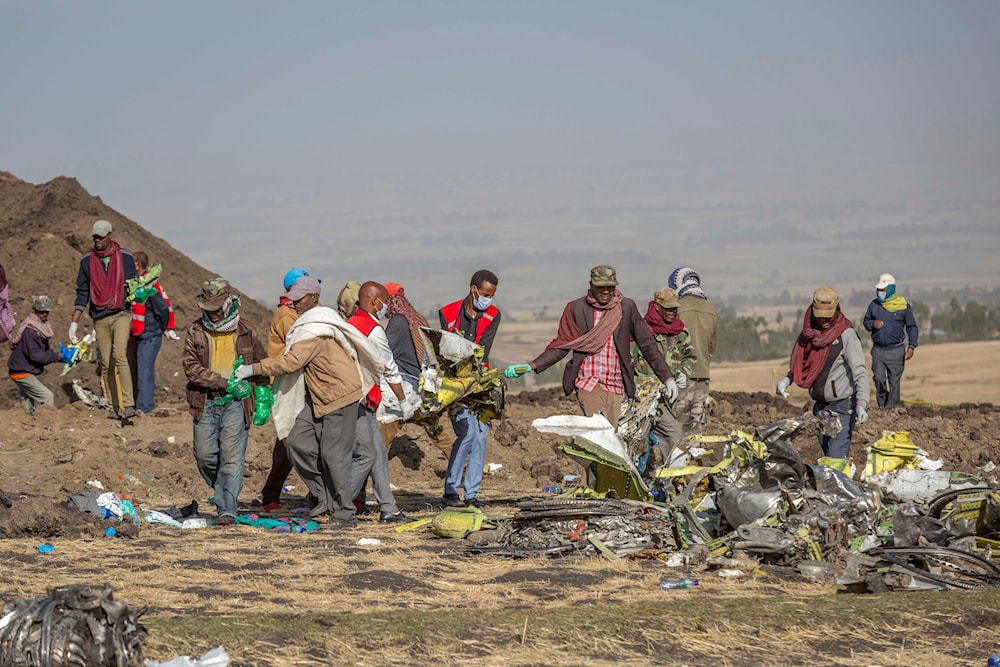Boeing takes plea deal over 737 Max crashes
The Department of Justice announces that Boeing accepted a plea deal in order to avoid a criminal trial over the crashes of its 737 Max aircraft.
-

Rescuers work at the scene of an Ethiopian Airlines Boeing Max crash near Bishoftu, or Debre Zeit, south of Addis Ababa, Ethiopia, on March 11, 2019. (AP)
Boeing has agreed to plead guilty to a criminal fraud charge related to the crashes of two 737 Max jetliners that killed 346 people, the US Justice Department said Sunday evening after it was concluded that the company violated a previous agreement that had protected it from prosecution for more than three years.
The charge involves Boeing admitting to conspiracy to defraud the United States. As part of the plea deal, Boeing will pay an additional $243.6 million fine and will be subject to oversight by an independent monitor for three years. This agreement, however, still requires approval from a federal judge.
The two tragic crashes occurred in Indonesia in 2018 and Ethiopia in 2019, both linked to a flight-control system about which Boeing was accused of misleading regulators. In 2021, Boeing reached a $2.5 billion settlement that included the same $243.6 million fine and commitments to comply with specific conditions.
Boeing blamed two low-level employees for misleading the regulators and tried to put the crashes behind it; the Max jets were then grounded for 20 months before regulators allowed them to fly again following claims that the aerospace conglomerate had reduced the power of the software.
On May 7, the US Federal Aviation Administration (FAA) stated that it was "investigating whether Boeing completed the inspections and whether company employees may have falsified aircraft records."
Criminal prosecution
The DoJ had said it was exploring a criminal prosecution of Boeing over breaking the conditions of the 221 settlement. Boeing had claimed it had followed the provisions of the 2021 agreement. However, the firm has seen a string of safety mishaps in recent months, including an in-flight door panel burst on a 737 MAX 9 operated by Alaska Airlines.
The families of the victims have criticized the plea deal, describing it as a "sweetheart deal" that fails to hold Boeing fully accountable for the deaths of 346 people. They plan to ask the judge to reject the agreement, arguing that the deadly consequences of Boeing's actions are being obscured.
"This sweetheart deal fails to recognize that because of Boeing’s conspiracy, 346 people died. Through crafty lawyering between Boeing and DOJ, the deadly consequences of Boeing's crime are being hidden," the Associated Press quoted Paul Cassell, a lawyer for some of the families, as saying.
The plea deal does not cover other incidents, such as the aforementioned Alaska Airlines flight. The Justice Department initiated a new investigation into Boeing following this event.
The Alaska incident happened only two days before the DOJ settlement was slated to expire. Prosecutors had previously agreed to pursue a formal dismissal of the deferred fraud allegation as long as Boeing followed the conditions of the agreement for three years.
A lot on the line
A criminal conviction could jeopardize Boeing's status as a federal contractor, a significant concern given the company's role as a crucial defense contractor and supplier for NASA, as well as the fact that 37% of its revenue last year was from US government contracts.
During a recent Senate hearing, Boeing CEO David Calhoun merely apologized to the families of the crash victims and defended the company's safety record.
The guilty plea will be entered in Texas, where a judge will determine whether to accept the plea agreement or push for further negotiations between the Justice Department and Boeing.
Aside from legal compliance difficulties, Boeing failed a government safety examination of its production methods following the airborne door rupture. The New York Times reported in March that Federal Aviation Administration (FAA) inspectors discovered scores of quality-control flaws, including the use of dish soap and a hotel key card as substitute tools. The FAA has initiated an investigation into the suspected fabrication of inspection records at a Boeing facility in South Carolina.
The DOJ has not made a final decision on whether to charge Boeing, and internal conversations are ongoing, according to Reuters. Potential charges might be beyond the boundaries of the 2021 fraud settlement. One of the individuals stated that additional alternatives include extending the prior settlement deal or demanding tougher compliance.

 4 Min Read
4 Min Read








